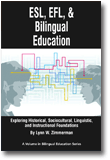
ESL, EFL and Bilingual Education
Exploring Historical, Sociocultural, Linguistic, and Instructional Foundations
By:
Lynn W. Zimmerman, Purdue University Calumet
A volume in the series: Research in Bilingual Education. Editor(s): Mileidis Gort, University of Colorado Boulder.
Published 2010
This collection of essays examines the historical, social, cultural, and educational foundations of ESL/EFL/Bilingual Education. The four themes of this book are:
¨ Historical, Legal and Political Foundations of Bilingual/ESL Education
¨ Linguistic and Sociocultural Issues in ESL/EFL Education
¨ Educational Reform and English Language Teaching
¨ Effectively Teaching Bilingual/ESL/EFL Students
This volume offers a concise overview of English language learning issues from foundations to current reform to practical guidelines to implement in the classroom. The articles are a variety of theoretical essays, reports of research and practical guides to teaching ESL/EFL/bilingual populations. Many of the essays are presented from the perspective of critical pedagogy relying on the work of educational theorists such as Paulo Freire, Lisa Delpit, and Michael Apple. Although there are connections among the essays, this collection allows the reader to read any of the essays as individual pieces, so the reader can focus on the issues that are most relevant.
This book is aimed at instructors of ESL/EFL/bilingual foundations courses. It would be appropriate for undergraduate or graduate level courses. There is some international appeal for this text since several of the essays focus on general English language learning issues, and at least two focus on international issues.
CONTENTS
PART I: HISTORICAL, LEGAL, AND POLITIAL FOUNDATIONS OF BILINGUAL/ESL EDUCATION. PART II: LINGUISTIC AND SOCIOCULTURAL ISSUES IN ESL/EFL EDUCATION. PART III: EDUCATIONAL REFORM AND ENGLISH LANGUAGE TEACHING. PART IV: EFFECTIVELY TEACHING BILINGUAL/ESL/EFL STUDENTS.
REVIEWS
"...Zimmerman’s book is an easy-to-read introductory guide to some important issues in the education of linguistic minorities, namely some important consequences of the implementation of No Child Left Behind, problems affecting bilingual education, the need to introduce courses specifically addressing the schooling of children with special needs in teacher preparation programs, or the struggles of international students attending U.S. universities. Additionally, the inclusion of articles on curricular reform in Poland and Latvia or aging and learning English permit readers’ access to interesting topics, not very frequently covered in this type of publication, yet obviously pertaining to the teaching of English as a Foreign or Second language worldwide." Francisco Ramos Loyola Marymount University in Education Review
-
Paperback978-1-61735-031-3
Web price: $45.04 (Reg. 52.99)
-
Hardcover978-1-61735-032-0
Web price: $80.74 (Reg. 94.99)
- eBook9781617350337

- EDU015000 - EDUCATION: Higher
- EDU037000 - EDUCATION: Research
- EDU003000 - EDUCATION: Aims & Objectives
-
 Effective Educational Programs, Practices, and Policies for English Learners
Effective Educational Programs, Practices, and Policies for English Learners
-
 Innovative Curricular and Pedagogical Designs in Bilingual Teacher Education
Bridging the Distance with School Contexts
Innovative Curricular and Pedagogical Designs in Bilingual Teacher Education
Bridging the Distance with School Contexts
-
 Negotiating Social Contexts
Identities of Biracial College Women
Negotiating Social Contexts
Identities of Biracial College Women
-
 Promoting Equitable Classroom Practices in Higher Education
Approaches Beyond Curriculum
Promoting Equitable Classroom Practices in Higher Education
Approaches Beyond Curriculum
-
 Teacher Training and Effective Pedagogy in the Context of Student Diversity
Teacher Training and Effective Pedagogy in the Context of Student Diversity
-
 The Bilingual School in the United States
A Documentary History
The Bilingual School in the United States
A Documentary History
-
 The Handbook for Aspiring Higher Education Leaders
The Handbook for Aspiring Higher Education Leaders

